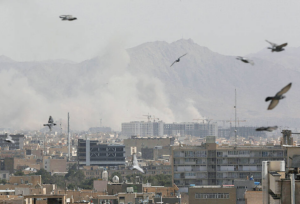
A woman holds a leaflet for the candidate for Qatar’s Shura council elections Leena al-Dafa during a campaign event in Doha ahead of the country’s first legislative polls
Advertising Read more
Doha (AFP)
Qatari women are standing in the country’s first legislative election Saturday, but in far lower numbers than men, prompting warnings that their influence on issues that affect women could be limited.
Of the 284 hopefuls running for the 30 available council seats, just 28 are women. The remaining 15 seats will be appointed by the emir with analysts suggesting he may name a number of women to right the imbalance in the body which will draft laws and scrutinise ministers.
“It’s an extremely positive step that women are part of this process,” said Elham Fakhro, senior Gulf analyst at the International Crisis Group.
“However, I think we do have to limit our expectations (of their influence)… as there are only 28 women running for positions — it really shouldn’t be surprising.”
One candidate, Leena al-Dafa, said her priorities if elected would be promoting education for women, supporting female teachers and the issue of citizenship for the children of Qatari women.
Qatari citizenship can currently only be inherited by children from their fathers, meaning the children of a Qatari woman who marries someone of another nationality will not be citizens.
This affects the children’s ability to benefit from lavish grants, land allocations and other state support in the gas-rich emirate.
“The most important issues for me are (citizenship of) children of Qatari women and documents. This is the most important issue that I adopted from the heart,” Dafa told AFP ahead of a campaign event.
Dafa, an education official who is running in Qatar’s 17th district against two women and seven men, said competence was more important than gender.
“I do not see it as a competition between me and the men because I see the men as complementary to the legislative process.
“And we are talking about competencies, not gender,” she added, before addressing a small crowd of women voters at Qatar’s Education City golf club.
– ‘Gender balance’ –
Fakhro suggested the emir could directly appoint women “to improve the gender balance” if none or few are elected — similar to what happened in Bahrain’s legislative election.
Analysts suggest the emir could directly appoint women “to improve the gender balance” – AFP/File
Representation of women in Qatar is stronger than in its Gulf neighbours Saudi Arabia and the UAE with the health ministry led by a woman and the foreign ministry represented by a spokeswoman.
Women also hold prominent roles in the World Cup organising committee as well as philanthropy and the arts, medicine, law and business.
But in March, Human Rights Watch accused Qatar of restricting the lives of its female population through unclear “guardianship” rules requiring adult women to obtain male approval for everyday activities.
The constitution of Qatar, a conservative Muslim Gulf state, provides for “equal opportunities for all citizens”.
Despite concrete progress, women “continue to face deep discrimination in almost all aspects of their lives,” HRW said in a report calling for reform.
Guardians are typically male relatives and can be fathers, brothers, uncles or cousins, but women cannot act as guardians for their children even if they are widowed.
– ‘We need more’ –
Men outnumber women in Qatar by 2.6 to one, according to the latest official data, largely because of the disproportionate number of migrant workers in Qatar who are men.
Candidate Leena al-Dafa listed her priorities as promoting women’s education and winning the right for Qatari women to give citizenship to their children – AFP
Qatari officials have previously insisted “gender equality and female empowerment” are central to the Gulf state’s “success and vision”.
Fakhro, the analyst, said women running in Gulf elections was an important signal “that these countries are ready to advance women and do want them to be part of public life”.
“(They can) advance women’s rights and to ensure legislative equality in areas of family law and divorce — and across the board,” she said.
Diplomatic sources have told AFP of tense meetings as male officials have previously sought to answer questions from groups of women about the complex and often uncodified guardianship system.
Last year, dozens of Qatari women took to social media to decry guardianship rules, particularly around the need for a male guardian’s permission to leave the country.
HRW previously acknowledged that Qatari women had “broken barriers and achieved significant progress”, pointing to the number of female graduates, which outstrips males, and the high per capita number of female doctors and lawyers.
© 2021 AFP






